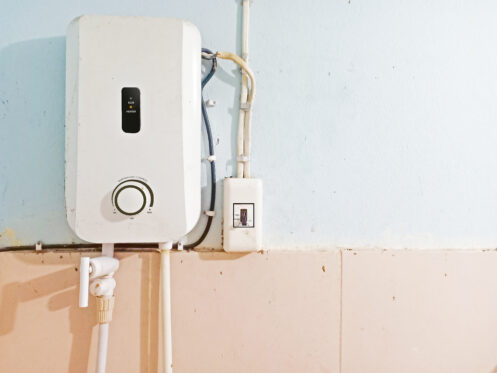If you’re dedicated to making your home more energy efficient, then why not install a tankless water heater? Portland residents will be pleased to know that according to Energy.gov, a typical household can save more than $100 per year with an ENERGY STAR® tankless appliance.
Unlike conventional storage water heaters that store between 30 and 80 gallons of heated water, tankless water heaters don’t store any hot water at all. Instead, when a hot water tap in the residence is turned on, they provide hot water on demand by heating cold water using an electric element or a gas burner. This “supply on demand” approach means households waste less money on energy costs to keep a tankful of water heated. However, the output can limit the flow rate, which is between two and five gallons depending on whether it’s an electric or gas-fired model. If you have a large household, one way to ensure a good flow rate is to install a second tankless water heater to provide extra hot water to appliances such as your dishwasher or washing machine.
In terms of actual energy savings, it’s interesting to note that tankless water heaters can offer between 24 and 34% more energy efficiency for households that use less than 41 gallons of hot water a day. Larger households that use approximately 86 gallons a day can expect to see 8 to 14% more energy efficiency.
One significant difference between conventional and tankless water heaters is the price. Conventional models can cost as little as $500, while tankless models are usually priced at around $1,000. Though the initial investment is higher for a tankless water heater, its expected life span is generally about 20 years—that’s more than seven years longer than that of a storage model.
Last, but certainly not least, a tankless water heater is roughly the size of a computer, while a conventional storage model can approach that of a refrigerator. This can mean all the difference in the world for Portland residents with premium real estate who want to make the most of their square footage.
Sources:
http://energy.gov/energysaver/articles/tankless-or-demand-type-water-heaters
http://www.apartmenttherapy.com/pros-and-cons-of-a-tankless-water-heater-176538


